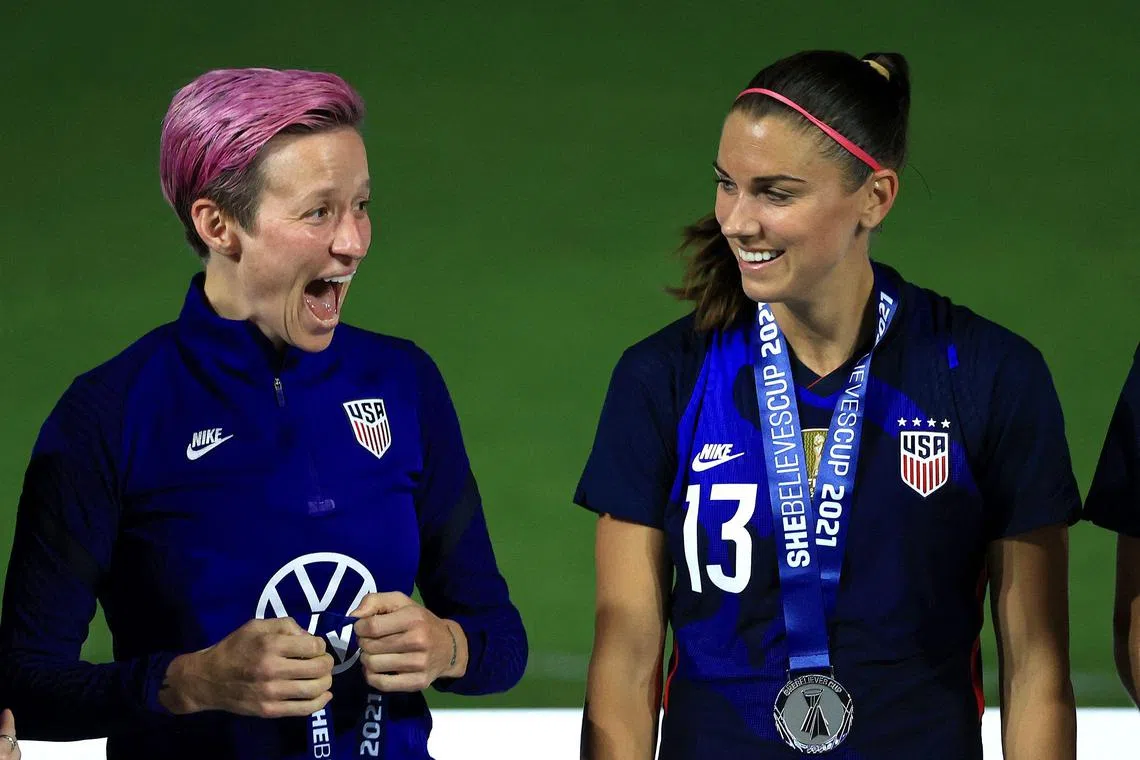US veteran Alex Morgan sees progress in Fifa's World Cup prize plan
Sign up now: Get the biggest sports news in your inbox

Megan Rapinoe (left) and Alex Morgan of the United States are both optimistic regarding the future of women's football.
PHOTO: AFP
LOS ANGELES – A new Fifa plan to distribute Women’s World Cup prize money directly to players will help level the playing field for competitors, United States veteran forward Alex Morgan said on Tuesday, ahead of her fourth appearance at the tournament.
Each player at the World Cup, which kicks off on July 20 in Australia and New Zealand, will be guaranteed at least a US$30,000 (S$40,600) payday in a Fifa first to distribute prize money to individuals rather than federations.
All members of the winning team will each take home US$270,000, part of a US$152 million total prize pool that is roughly 300 per cent higher than in 2019.
That total figure still significantly trails what was offered at the Qatar 2022 men’s tournament, where a US$440 million prize fund was available.
“Fifa has actually done – surprisingly (this is) coming out of my mouth – a very good job at increasing the prize money,” Morgan said.
“We still have ways to go, but having them direct payments to the players is huge.
“I mean, it’s a life-changing thing for some of these players entering the tournament. So coming away with each player making at least US$30,000 is huge.”
The US men’s and women’s teams agreed landmark collective bargaining agreements (CBAs) with US Soccer in 2022 that see the players receive equal pay and prize money, including at World Cups.
The two teams have identical performance-based bonuses for all games and competitions under the CBAs, which were reached months after the women’s team and the federation resolved a years-long dispute over equal pay.
“With US Soccer, we have in our contract equal prize money between the men and the women, which is a shared pot. And that’s the only federation in the world that does that,” Morgan added.
“We’re very happy that we fought for that and were able to attain that. Now it’s up to Fifa and the other federations to do their part.”
Morgan’s teammate and fellow veteran Megan Rapinoe, meanwhile, said that the upcoming Women’s World Cup feels like a “paradigm shift” in the global business of women’s sports, even as inequities persist.
She agreed largely with what Morgan had said, that there was still work to be done to ensure the world’s best women footballers are properly compensated, but noted there is no doubt that the Women’s World Cup has become one of the top sporting events in the world.
“I think, just in general, women’s sports right now feels like we’re sort of out of just the dogged fight phase,” Rapinoe said.
“It feels like a real opportunity to blow the lid off just in terms of fanfare and media and sponsorships and the sort of larger business around this sport.
“I think everyone understands that this is not somewhere that’s just like, ‘Oh, we should cheer for the Women’s World Cup because that’s the right thing to do’.
“It is actually terrible business if you are not tuning in – you are missing out on a large cultural moment...
“This is the premier women’s sporting event in the world bar none and this is a paradigm shift globally, not just in the US.”
While things are looking bright for women’s football, issues still exist.
Canada’s women remain locked in a labour dispute with their federation, with captain Christine Sinclair saying last week she expected at least a temporary solution to be reached before the World Cup.
Jamaica, meanwhile, have resorted to fund-raising campaigns as they prepare for the tournament because of a lack of resources from the federation.
“It’s infuriating,” Rapinoe added. “It doesn’t have to be like this. But I do think it’s getting better... I think that there’s a lot more resources that these teams can tap into.”
The United States kick off their World Cup campaign against Vietnam in Auckland on July 22. REUTERS, AFP


